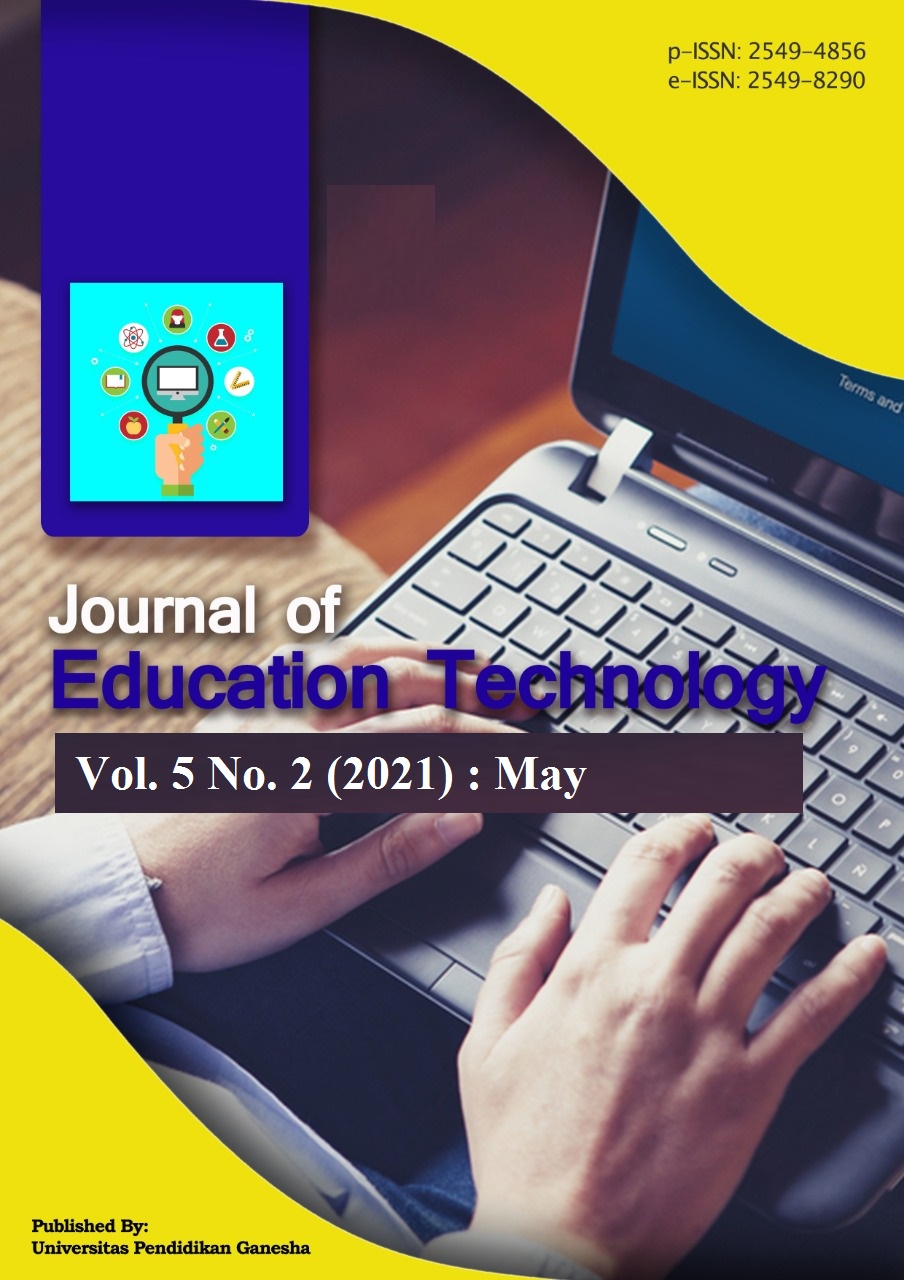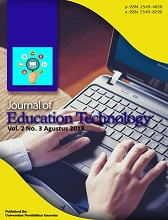Online Training: An Alternative Solution of the Empowerment for Parents of Children with Autism
DOI:
https://doi.org/10.23887/jet.v5i2.34313Kata Kunci:
Autism, Independent Intervention Program, Online Training, ParentsAbstrak
Parents need to understand how important it is to provide proper treatment in dealing with children with autism. The effort is with an intervention approach technique, but some parents often experience difficulties in making intervention efforts. One solution to the problem that can be done is by establishing the Independent Intervention Program Online Training (PIM). This study aims to prove that the Independent Intervention Program Online Training or PIM is an effective way to empower parents in dealing with children with autism. The research was conducted through field trials involving 11 parents of children with autism from a number of cities in Indonesia. Subjects were provided PIM Online Training by platforms such as Zoom, Website, and WhatsApp. Training effectiveness data is seen from the results of the subject's self-evaluation before and after training. The results showed that after participating in the PIM Online Training, parents saw themselves better in understanding the concept of Autism Spectrum Disorder (ASD), social skills, intervention, and individual intervention programs, as well as skills in designing intervention programs for children with disabilities. autism, compared to pre-training conditions. Based on these results, PIM Online Training is expected to be the right solution to empower parents in designing social skills intervention programs for children with autism, without limitation of time, place and cost.
Referensi
Allen, A. A., & Shane, H. C. (2014). Autism Spectrum Disorders in the Era of Mobile Technologies: impact on caregivers. Developmental Neurorehabilitation, 17(2), 110–114. https://doi.org/10.3109/17518423.2014.882425.
Autism Ontario. (2012). What to Look for When Choosing Social Skills Programs for People with ASD. Social Matters: Improving Social Skills Intervention for Ontarians with ASD.
Beaudoin, A. J., Sébire, G., & Couture, M. (2014). Parent Training Interventions for Toddlers with Autism Spectrum Disorder. Autism Research and Treatment, 2014, 1–15. https://doi.org/10.1155/2014/839890.
Booth, N., Gallagher, S., & Keenan, M. (2018). Autism, Interventions and Parent Training. Psichologija, 57(2018), 74–94. https://doi.org/10.15388/Psichol.2018.0.11904.
Douglas, S. N., Nordquist, E., Kammes, R., & Gerde, H. (2017). Online Parent Training to Support Children with Complex Communication Needs. Infants and Young Children, 30(4), 288–303. https://doi.org/10.1097/IYC.0000000000000101.
Dunst, C. J., Bruder, M. B., & Espe-Sherwindt, M. (2014). Family Capacity-Building in Early Childhood Intervention: Do Context and Setting Matter? School Community Journal, 24(1), 37–49.
Elder, J. (2013). Empowering Families in the Treatment of Autism. In Recent Advances in Autism Spectrum Disorders - Volume I. InTech. https://doi.org/10.5772/54303.
Ilias, K., Liaw, J. H. J., Cornish, K., Park, M. S.-A., & Golden, K. J. (2017). Wellbeing of mothers of children with “A-U-T-I-S-M” in Malaysia: An interpretative phenomenological analysis study. Journal of Intellectual & Developmental Disability, 42(1), 74–89. https://doi.org/10.3109/13668250.2016.1196657.
Ingersoll, B., & Wainer, A. (2013). Initial Efficacy of Project ImPACT: A Parent-Mediated Social Communication Intervention for Young Children with ASD. Journal of Autism and Developmental Disorders, 43(12), 2943–2952. https://doi.org/10.1007/s10803-013-1840-9.
Ingersoll, B., Wainer, A. L., Berger, N. I., Pickard, K. E., & Bonter, N. (2016). Comparison of a Self-Directed and Therapist-Assisted Telehealth Parent-Mediated Intervention for Children with ASD: A Pilot RCT. Journal of Autism and Developmental Disorders, 46(7), 2275–2284. https://doi.org/10.1007/s10803-016-2755-z.
Irvan, M. (2016). Pengetahuan Orang Tua, Guru, dan Terapis tentang Anak Autism Spectrum Disorder. HELPER : Jurnal Bimbingan Dan Konseling, 32(2). https://doi.org/10.36456/helper.vol32.no2.a466.
Iswari, M., Kasiyati, K., Zulmiyetri, Z., & Hasan, Y. (2019). Training Increases Understanding of Teachers and Parents About Healthy Food for Children with Autism. Jurnal Aplikasi IPTEK Indonesia, 3(3), 116–120. https://doi.org/10.24036/4.1296.
Karst, J. S., & Van Hecke, A. V. (2012). Parent and Family Impact of Autism Spectrum Disorders: A Review and Proposed Model for Intervention Evaluation. Clinical Child and Family Psychology Review, 15(3), 247–277. https://doi.org/10.1007/s10567-012-0119-6.
Kasari, C., Gulsrud, A., Paparella, T., Hellemann, G., & Berry, K. (2015). Randomized Comparative Efficacy Study of Parent-Mediated Interventions for Toddlers with Autism. Journal of Consulting and Clinical Psychology, 83(3), 554–563. https://doi.org/10.1037/a0039080.
Kolb, M. J. (2007). An Online Training Program for Parents of Children with Autism. University of Maryland.
Kuravackel, G. M., Ruble, L. A., Reese, R. J., Ables, A. P., Rodgers, A. D., & Toland, M. D. (2018). COMPASS for Hope: Evaluating the Effectiveness of a Parent Training and Support Program for Children with ASD. Journal of Autism and Developmental Disorders, 48(2), 404–416. https://doi.org/10.1007/s10803-017-3333-8.
Kurniadi, G., Atmodiwirjo, E. T., & Soetikno, N. (2019). Hubungan Antara Harapan Dan Stres Orang Tua Yang Memiliki Anak Dengan Autisme. Jurnal Muara Ilmu Sosial, Humaniora, Dan Seni, 3(2), 358. https://doi.org/10.24912/jmishumsen.v3i2.3860.
Murray, M., Handyside, L., Straka, L., & Arton-Titus, T. (2013). Parent empowerment: connecting with preservice special education teachers. School Community Journal, 23(1), 145–168.
Negri, L. M., & Castorina, L. L. (2014). Family Adaptation to a Diagnosis of Autism Spectrum Disorder. In J. Tarbox, D. R. Dixon, P. Sturmey, & J. L. Matson (Eds.), Handbook of Early Intervention for Autism Spectrum Disorders. Springer New York. https://doi.org/10.1007/978-1-4939-0401-3.
Oono, I. P., Honey, E. J., & Mcconachie, H. (2013). Parent-mediated early intervention for young children with autism spectrum disorders (ASD). Cochrane Database of Systematic Reviews, 2013(4). https://doi.org/10.1002/14651858.CD009774.pub2.
Patricia, K. G., Fumio, J. B., Rita, S., Steven, C. S., Nidal, K. K., David, D., & Smith, S. (2015). Changing College Students ’ Conceptions of Autism : An Online Training to Increase Knowledge and Decrease Stigma. Journal of Autism and Developmental Disorders, 45, 2553–2566. https://doi.org/10.1007/s10803-015-2422-9.
Patterson, S. Y., Smith, V., & Mirenda, P. (2012). A systematic review of training programs for parents of children with autism spectrum disorders: Single subject contributions. Autism, 16(5), 498–522. https://doi.org/10.1177/1362361311413398.
Pennefather, J., Hieneman, M., Raulston, T. J., & Caraway, N. (2018). Evaluation of an Online Training Program to Improve Family Routines, Parental Well-Being, and the Behavior of Children with Autism. Research in Autism Spectrum Disorders, 54, 21–26. https://doi.org/10.1016/j.rasd.2018.06.006.
Pillay, M., Alderson-Day, B., Wright, B., Williams, C., & Urwin, B. (2011). Autism Spectrum Conditions - Enhancing Nurture and Development (ASCEND): An evaluation of intervention support groups for parents. Clinical Child Psychology and Psychiatry, 16(1), 5–20. https://doi.org/10.1177/1359104509340945.
Primasari, I. F. N. D., & Supena, A. (2020). Peran Orang Tua Anak Berkebutuhan Khusus (Autis) Sekolah Dasar Selama Masa Covid-19. JS (Jurnal Sekolah), 5(1), 133–142. https://doi.org/10.24114/js.v5i1.23309.
Putri, A. M., Pramesti, W., & Hapsari, R. D. (2019). Stres Pada Orang Tua Yang Memiliki Anak Dengan Gangguan Spektrum Autisme. Jurnal Psikologi Malahayati, 1(1), 7–13. https://doi.org/10.33024/jpm.v1i1.1408.
Rafikayati, A., & Jauhari, M. N. (2018). Keterlibatan Orangtua dalam Penanganan Anak Berkebutuhan Khusus. Jurnal Abadimas Adi Buana, 2(1), 55–64. https://doi.org/10.36456/abadimas.v2.i1.a1636.
Rudy, L. J. (2013). Should Parents Provide Their Own Children’s Autism Therapy?
Schultz, T. R., Schmidt, C. T., & Stichter, J. P. (2011). A review of parent education programs for parents of children with autism spectrum disorders. Focus on Autism and Other Developmental Disabilities, 26(2), 96–104. https://doi.org/10.1177/1088357610397346.
Steiner, A. M., Koegel, L. K., Koegel, R. L., & Ence, W. A. (2012). Issues and Theoretical Constructs Regarding Parent Education for Autism Spectrum Disorders. Journal of Autism and Developmental Disorders, 42(6), 1218–1227. https://doi.org/10.1007/s10803-011-1194-0.
Suppo, J. L., & Mayton, M. R. (2014). Expanding Training Opportunities for Parents of Children with Autism. Rural Special Education Quarterly, 33(3), 226. https://doi.org/10.1177/875687051403300304.
Susilana, R., Herlina, & Hadiapurwa, A. (2020). Pengembangan Website Pelatihan Program Intervensi Mandiri (PIM©) bagi Orangtua Anak Penyandang Autisme. Pedagogia Jurnal Ilmu Pendidikan, 18(02), 173–187. https://doi.org/10.17509/pdgia.v18i2.31424.
Tirtayani, L. A., Magta, M., & Lestari, N. G. A. M. Y. L. (2017). Teacher Friendly e-Flashcard: a development of bilingual learning media for young learners. Journal of Education Technology., 1(1), 18–29. http://dx.doi.org/10.23887/jet.v1i1.10080.
Yuwono, J., Martika, T., & Anggrellanggi, A. (2020). Parental Competencies in Providing Services for the Development of Autistic Children. Jurnal Exponential (Education for Exceptional Children) Jurnal Pendidikan Luar Biasa, 1(2), 181–193.
Zorzi, S., & Marzano, G. (2020). Parent-Training to Support Parents of Children with Autism Spectrum Disordes. Society. Integration. Education. Proceedings of the International Scientific Conference, 4, 177–186. https://doi.org/10.17770/sie2020vol4.4834.
Unduhan
Diterbitkan
Cara Mengutip
Terbitan
Bagian
Lisensi
Authors who publish with the Journal of Education Technology agree to the following terms:
- Authors retain copyright and grant the journal the right of first publication with the work simultaneously licensed under a Creative Commons Attribution License (CC BY-SA 4.0) that allows others to share the work with an acknowledgment of the work's authorship and initial publication in this journal.
- Authors are able to enter into separate, additional contractual arrangements for the non-exclusive distribution of the journal's published version of the work (e.g., post it to an institutional repository or publish it in a book), with an acknowledgment of its initial publication in this journal.
- Authors are permitted and encouraged to post their work online (e.g., in institutional repositories or on their website) prior to and during the submission process, as it can lead to productive exchanges, as well as earlier and greater citation of published work. (See The Effect of Open Access)


















